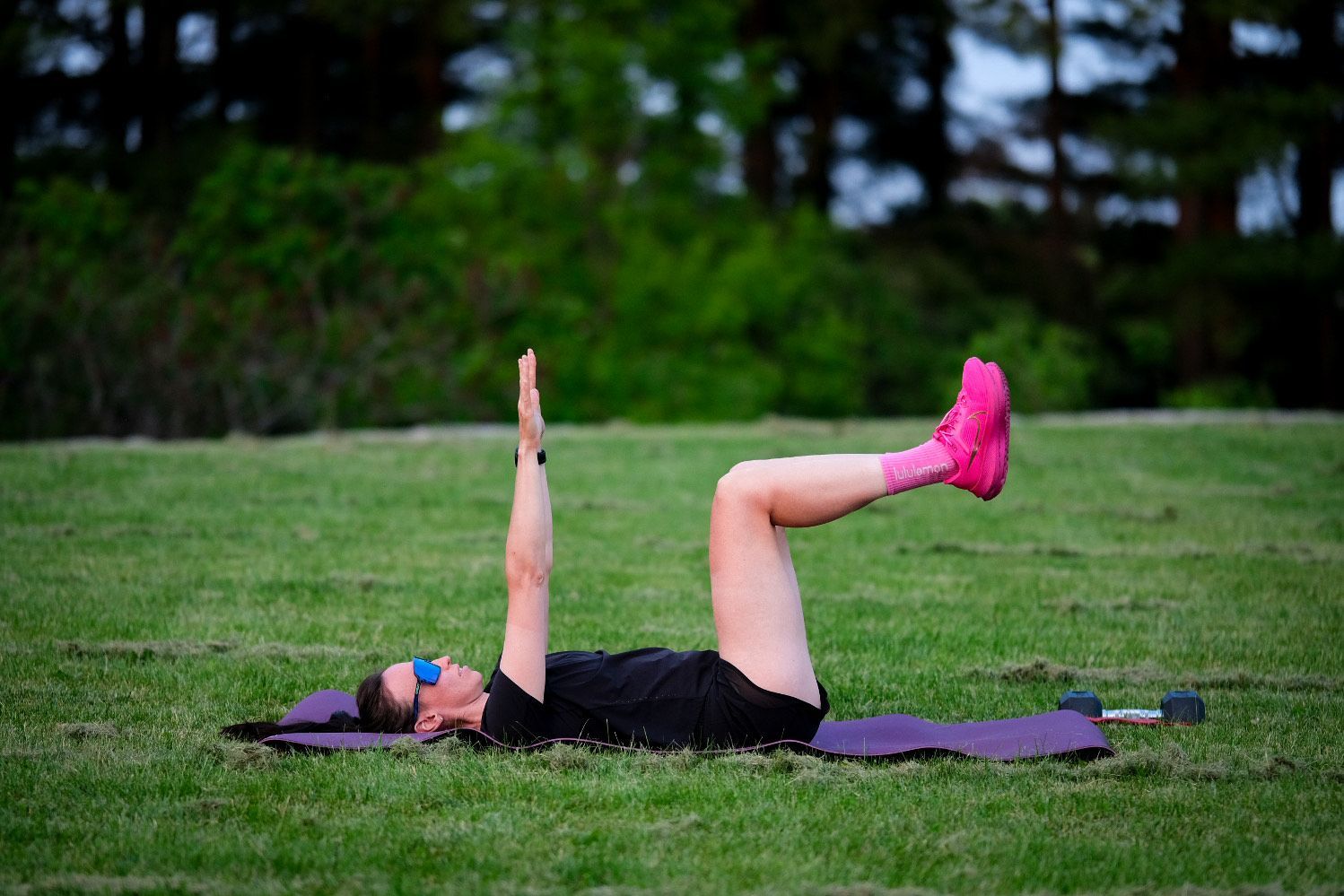Training Through Perimenopause: Supporting Women Facing Heavy Cycles, Low Energy, and Hormonal Challenges
Perimenopause, the transitional phase leading up to menopause, can be a rollercoaster of physical and emotional changes. Hormonal fluctuations may cause symptoms including heavy cycles, low energy, and shifts in metabolism, which can make training feel unpredictable. But here’s the good news: Fitness during perimenopause isn’t about giving up. It is about adapting and setting new goals. With the right strategies, mindset, and support, women can not only maintain their fitness goals but thrive during this phase of life. In fact, this could be the most important time in your life to continue training.
Whether you’re dealing with unexplained weight gain, inconsistent energy, or a changing body, a tailored training plan can help you stay active, build strength, and feel empowered.
Understanding Perimenopause and Its Impact on Fitness
Beyond common hot flashes, perimenopause often brings uncomfortable symptoms such as:
- Irregular or heavy menstrual cycles
- Fatigue and disrupted sleep
- Slower metabolism, resulting in weight changes
- Decreased muscle mass and bone density
- Joint discomfort
- Moodiness and/or “brain fog,” which may cause you to lose interest in workouts
For many women, these changes can be frustrating, but they are not insurmountable. Instead of forcing the body to follow rigid routines, this is the time to listen to it, adapt, and prioritize long-term health over quick fixes.
My coaching philosophy centers on working with the body’s natural rhythms, helping women stay consistent while navigating hormonal changes.
How I Support Women Through Perimenopause
As a coach, I take a personalized, compassionate approach to training during perimenopause. My aim is to empower women by creating adaptable programs that consider their unique needs, energy levels, and goals. Here’s how:
1. Prioritizing Flexibility
Perimenopause is unpredictable. Some days you’ll feel energized; others, you’ll want to take it slow. My plans allow for this flexibility. On low-energy days, we focus on restorative movement like yoga or walking. On high-energy days, we maximize output with strength or cardio sessions.
2. The Power of Strength Training
Muscle mass naturally declines during perimenopause, which impacts metabolism, strength, and bone health. Strength training becomes a cornerstone of fitness, improving overall physical resilience while also increasing bone density. This is particularly important, as bone loss is accelerated during perimenopause and menopause. Resistance exercises such as weightlifting, bodyweight movements, and resistance bands are prioritized.
Note that there is an abundance of research supporting the idea that “lifting heavy,” whatever that means for you as an individual, is especially beneficial through the years of perimenopause, menopause, and post-menopause. It’s normal to lose muscle mass during this time, but it’s also preventable. Retaining, or better yet, building muscle mass will not only support bone health, it will improve metabolism, keep your heart healthy, and stave off frailty later in life.
3. Balancing Intensity and Recovery
High-intensity interval training (HIIT) and endurance workouts are still beneficial, but recovery must take center stage. By alternating high-effort days with restorative activities, we prevent burnout and allow the body to rebuild and recharge.
4. Adapting to Your Body’s “New-for-Now” Normal
Fatigue, headaches, moodiness, and unpredictable cycles are all common complaints during perimenopause. These can feel like roadblocks to fitness, but they don’t have to derail progress.
As an example, an athlete I work with experiences frequent, heavy periods. This new and unexpected symptom takes her out of training for several weeks at a time, a situation she finds distressing and discouraging. We are able to keep her training going, despite this challenge, though. By tracking symptoms and identifying patterns, we adapt workouts to fit her body’s needs. Training consistently and building endurance, she’s been hitting personal bests, and recently held her desired race pace during a long run. A promising sign as she prepares for her first-ever half-marathon.
Nutrition and Lifestyle Tips for Perimenopause Fitness
What you do outside of workouts is just as important as what you do during them. Here are some tips to support your training.
Diet and Supplements (Remember to check with your doctor before changing your diet or supplement regiment!):
- Calcium and Vitamin D: Women should prioritize calcium during perimenopause, a time when bone density is likely decreasing. Vitamin D assists with calcium absorption, so it’s essential to have adequate amounts of both. For calcium, 1200mg per day is recommended, and most experts recommend that this come from foods like Greek yogurt, dairy milk or calcium-fortified non-dairy milk, dark leafy greens, salmon, and other sources, rather than pills. Vitamin D is difficult to get in adequate amounts without getting a sunburn, so supplementing is essential in this case. For this supplement, 600 IU (or 15 mcg) is the recommended dose.
- Protein: To help maintain muscle, as well as to support bone health, protein is essential for athletes at the time of perimenopause. Generally, the recommendation is about 30 grams per meal, but you should check with a dietician or your doctor to confirm the amount that’s right for you. It’s important to note that adding protein doesn’t mean you should remove carbs. High-quality carbs, like fruits, starchy vegetables, and whole grains, are an essential part of a healthy diet, and they are especially important for endurance athletes.
- Fibre: You probably know that increasing fibre in your diet can deliver benefits like improved digestive health, but it may also help reduce symptoms of depression and the risk of ovarian cancer, according to a UK study. Many women feel uncomfortably bloated and face new digestive issues during perimenopause. Getting a healthy amount of fibre from whole grains, fruits, unsweetened dried fruits, vegetables, and high-fibre cereals like Bran Buds may help ease this discomfort. 21 grams are recommended daily.
Other supplements, including magnesium and iron, are frequently recommended, but your doctor may recommend blood work before adding these to your routine.
In general, eating a healthy, balanced diet rich in whole, unprocessed foods is always your best bet. The foundation of your meals should be fresh fruits and vegetables, whole grains, lean proteins, and healthy fats from sources like nuts, avocado, and olive oil.
Lifestyle Tips:
- Stop Counting Calories. It’s also important to eat enough, especially when you’re training. Resist the urge to count calories and restrict certain food groups, and focus instead on eating good quality foods when you feel hungry.
- Hydration: Make sure you’re drinking enough water every day. Water, herbal teas, and carbonated water are all great choices that can help you meet the widely accepted goal of 1600ml/day. (If you experience excessive perspiration due to hot flashes or night sweats, you may need more than this.)
- Sleep Optimization: Hormonal changes can disrupt sleep, but creating a consistent bedtime routine and reducing screen time before bed can improve rest. Sleeping between six and nine hours per night may alleviate some menopause symptoms, so it’s worth experimenting. Nearly half of Canadian women aren’t getting enough magnesium, which may contribute to sleep problems. If you still struggle to get sufficient rest even with a good routine, ask your doctor about a magnesium supplement.
- Rest days: It’s important to listen to your body and rest when you need to. I always build these into my athlete’s plans, but plans need to be flexible. If you’re feeling fatigued or achy, you may need to adjust your schedule - and that’s OK.
Mindset: Reframing Challenges into Opportunities
The emotional side of perimenopause is often overlooked, but it plays a crucial role in staying consistent with fitness goals. Many women feel frustrated by fluctuating performance or discouraged by changes in their bodies. Symptoms of depression and “brain fog,” both common in perimenopause, may exacerbate these feelings. My coaching focuses on:
- Shifting the Narrative: This isn’t about comparing yourself to your younger self. It’s about embracing where you are now and celebrating what your body is capable of achieving.
- Small Wins Matter: Every movement, whether it’s a full workout or a short walk, is progress. Consistency, not perfection, is the goal.
- Building Resilience: Resilience is about more than physical strength. It is about showing up, adapting, and giving yourself grace during the tough days.
- Strong for Life: By building strength, improving agility, and bolstering bone density now, you’re setting yourself up for better health and wellness as you age. The foundation you’re building today could benefit you into your 80s and beyond.
The Power of Community and Support
Fitness during perimenopause can feel isolating, but it doesn’t have to be. Joining a supportive community of women facing similar challenges can make all the difference.
As a coach, I aim to create more than just training plans. I provide a space where women feel seen, supported, and understood. Together, we share strategies, celebrate wins, and encourage one another through the ups and downs.
Thriving Through Perimenopause: A New Chapter in Fitness
Perimenopause is not an end. It is a new chapter that brings opportunities to discover new strengths, redefine fitness, and prioritize long-term health.
If you’re navigating this phase of life and feeling unsure where to start, I’d love to help. Together, we’ll create a tailored program that adapts to your body’s needs, helps you stay consistent, and ensures you feel strong and empowered every step of the way.
Why Choose Me as Your Coach?
- Expertise in Women’s Health: I specialize in fitness strategies that align with the unique hormonal and physical changes women experience during perimenopause. Many of my athletes are successfully navigating this stage of their lives, and I’m proud to be part of their journey.
- Personalized Plans: No cookie-cutter programs here. Your training plan will be tailored to your goals, energy levels, and lifestyle.
- Ongoing Support: From check-ins to mindset coaching, I’m here to support you through every stage of your journey.
Ready to get started? Let’s work together to redefine what thriving through perimenopause means for you.
Contact me today to schedule a consultation or learn more about my coaching programs.



